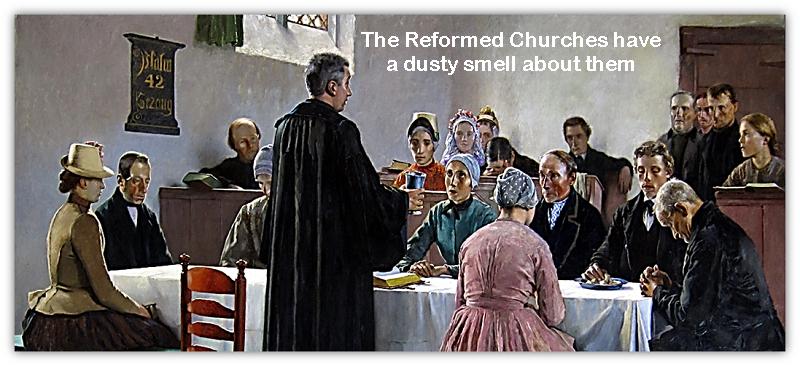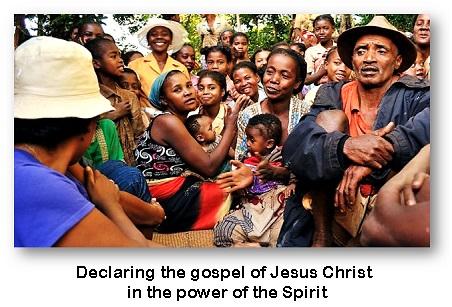'Traditional or Experimental'
'Traditional or Experimental'

‘No church can exist without structures and forms. The Reformed Churches have a dusty smell about them. Traditional forms aim to conserve foundational gospel concepts but they face the danger of irrelevance and alienation. Experimental forms allow spontaneity and relevance but are in danger of cultural accommodation and losing keynotes of our confession. How do we deal with this dilemma?’
Marginalisation of the church in Western countries has led to a period of critical self-examination as Christian leaders and academics seek to discern where the church has failed and how those failures can be overcome.
The fundamental conclusion arrived at has been to acknowledge that the church has not kept pace with the shift to a post Christian culture. Many of our structures and much of our communication are now a hindrance to fruitful gospel witness. This has led to a close re-examination of many aspects of the local church and its relationship to both the culture and wider ecclesiastical institutions.
For those of us who are concerned to be missionaries in our local situation this leads to many practical questions. As we begin to plant or revitalise a church, what shape should it take? What elements of our tradition are essential? Which can be discarded? What structures must be retained and in which areas can we be flexible? How do we hold on to what is of lasting value whilst at the same time connecting with those who are culturally distant from the church? How can we reach the large majority of people who will never attend a church service?
Missional Ecclesiology⤒🔗
Missional Ecclesiology takes as its starting point the understanding that the main purpose of the church is to be obedient to its God-given mission. The Missio Dei is the Missio Ecclesia. The Bible is read as a narrative of God’s mission to redeem a lost world. Our key function as the church is to play our part in this mission. So the life and worship of the church must be governed by this central concern; ‘How does this affect our mission?’ Alan Hirsch makes this point plainly, ‘The church’s true and authentic organizing principle is mission.’1
This concern to be true to our mission has led to a strong critique of traditional churches. It is good for us to listen to these criticisms as they bear on central aspects of church life. These criticisms are presented below in broad and summary fashion.
Worship←↰⤒🔗
The corporate worship of traditional churches is inward looking and very difficult for outsiders to engage with. The forms and language are archaic and impenetrable to those who have not been initiated into them. This is counter to the New Testament witness and the test of intelligibility. (1 Cor 14)
Community←↰⤒🔗
Traditional churches have failed to be true to their own ecclesiology. Whilst we adhere to the idea of church as the body of Christ and the family of believers by our practice we teach that church is about sacred buildings, and attendance at services and other events. People come and go from our services but know no true community.

Structure←↰⤒🔗
Denominations have become institutionalised and controlling and thus inhibit the flexibility and initiative necessary for mission. They preserve the past and extinguish the entrepreneurial spirit. ‘Institutional systems tend to try and organise through external hierarchical command and control.’2 What is needed are flexible structures that are dynamic, and easily reproduced. Organic systems produce relational networks that are intelligent and adaptive and the ability to adapt and reproduce is crucial to mission.
Confessions←↰⤒🔗
Traditional churches have Confessions that encourage unnecessary complexity and take away from the core message. We need a message that is rapidly transferrable and ‘freed from the philosophical density of the academy’3 The gospel needs to be easily grasped even by an illiterate peasant. A simple confession of the Lordship of Jesus Christ is the essential issue.
Leadership←↰⤒🔗
One of the key components of effective missionary churches is apostolic leadership. (Ephesians 4:11) This is humble, servant leadership marked by the moral and spiritual authority of an authentic gospel life. Traditional churches have leadership that reflects corporate values and the structure of a CEO and his subordinates. Such leadership is controlling and concerned with power. There is no ordained or professional ministry class in the New Testament. Apostolic leadership is liberating, empowering, pioneering and innovative.
Disciple making←↰⤒🔗
The key to mission is making disciples. Traditional churches do not have a strong culture of intentional discipleship. Most ministry is done by the salaried clergy who operate in the mode of preaching and pastoring. This means in practice spending most of their time preparing sermons, visiting the sick and conducting the rites of passage; i.e. baptisms, marriages and funerals. They do not make disciples and so are unable to establish a culture of disciple making.
Culture←↰⤒🔗
Hostility, suspicion, separation and isolation tend to mark the attitude of traditional churches towards the surrounding culture. This refusal to engage with and enter into the culture creates an inability to communicate meaningfully with non-Christians. Missional ecclesiology should be driven by the incarnational impulse to enter into other cultures and become a part of them for the sake of the gospel. Cultural flexibility is essential to effective mission. (1 Corinthians 9)
For Hirsch and others the key issue here is adaptation. Traditional churches do not have the capacity to adapt to the post – Christendom environment. Traditional churches will not give their congregations the freedom to adapt sufficiently to become effective in mission. The institutions of traditional denominations are incapable of creating an environment of rapid change and growth. And so a complete paradigm shift must occur. Traditional church must be left behind. New churches, new networks, new ways must be initiated and developed. Only these churches have the capacity to reproduce and multiply in a way that will meet the missionary challenge facing us today.
Reformed Ecclesiology←⤒🔗
Reformed Ecclesiology is driven by a concern to order the life and worship of the church in ways that are acceptable to God. The principle concern of the church is to maintain the true worship of the living God. All the idols of culture and religion must be cast aside. The principles and practice of worship and church life must be regulated by Scripture. So the driving concern in Reformed Ecclesiology has always been doxological rather than missional. Worship is the true and authentic organising principle of the church.
Calvin above all others has influenced the Reformed understanding of the church. He writes. ‘Wherever we see the word of God sincerely preached and heard, wherever we see the sacraments administered according to the institution of Christ, there we cannot have any doubt that the Church of God has some existence.’ Institutes Book 4, Chapter 1, Para 9.

Calvin and Calvinistic churches have seen preaching, and the right administration of the sacraments, as marks of the true church. Most Reformed Christians now hold that there are three marks of the true church.
Article 29 of the Belgic Confession says,
The true church can be recognized if it has the following marks: The church engages in the pure preaching of the gospel; it makes use of the pure administration of the sacraments as Christ instituted them; it practices church discipline for correcting faults. In short, it governs itself according to the pure Word of God, rejecting all things contrary to it and holding Jesus Christ as the only Head. By these marks one can be assured of recognizing the true church – and no one ought to be separated from it.
Calvin also established the regulative principle of worship, that the visible church should be organised as far as possible in line with what is proscribed or indicated in the New Testament and that the features of Presbyterian government are clear in the New Testament.
How is God to be worshipped? How should our worship services be developed? ‘Nothing is to be introduced into the government and worship of the church, unless a positive warrant for it can be found in Scripture.’4 The RPW of worship requires four elements to be present during corporate worship; the reading of the Word, the preaching of the Word, prayer and the singing of praise. In addition there is the observation of baptism and communion.
The manner in which the rest of the service is organised around these elements and the way in which these elements are expressed is much more flexible. The WCF acknowledges, ‘that there are some circumstances, concerning the worship of God and government of the church, common to human actions and societies, which are to be ordered by the light of nature and Christian prudence, according to the general rules of the word, which are always to be observed.’ The RPW provides an excellent principle, but we need to ‘make a reasonable and judicious application of it.’5
What about mission? For the Reformed Church mission has not been and is not the first priority. The first priority is worship, we are to glorify God and enjoy him forever. There will be worship in heaven but no mission. Mission is temporary and secondary. Worship is eternal and of first importance. The book of Revelation shows us that mission is a means to an end. The end is a total focus on the worship and the glory of the Lord Jesus Christ.
However this does not mean that mission is not of central importance to the Reformed Church.
The reformed view on mission has developed over time and tends to focus on the Great Commission and the call to go and make disciples.
The mission of the church is to go into the world and make disciples by declaring the gospel of Jesus Christ in the power of the Spirit and gathering these disciples into churches, that they might worship and obey Jesus Christ now and eternity to the glory of God the Father.6
Reformed Missional Ecclesiology←⤒🔗
The missional movement has helped bring mission back in from the margins of the Reformed Church to the central, but not ultimate place, it deserves. It has caused us to cease be inward looking and challenged us to look outwards to engage in mission in our own society.
A. General Terms←↰⤒🔗
In general terms to be Reformed and Missional should give the following view:
The Mission of God←↰⤒🔗
God’s mission is to create the church; a worshipping community of redeemed sinners that gives glory to him.
The Mission of the church: The mission of the church is to make disciples, gathering them into the worshipping community. Our mission is to bring others to be worshippers of God. Mission and evangelism should not be seen as one activity of the church but as having a central importance which shapes and influences every activity of the church. We are always anticipating and responding to the presence of non-believers from the surrounding culture.

A Biblical View of Church←↰⤒🔗
Many people in reformed congregations have a narrow view of church that relates the church to a place (building) or an event (service.) God’s people are the church and whilst the church needs organisation, structure and discipline it also needs to be aware of its self as a community of people called together by God, living out the gospel together. Church is not where we go but who we are.
Focus on the Local Church as the place of Mission and Ministry←↰⤒🔗
Most Reformed denominations are not fit for mission and must be turned on their heads. Most denominations were formed by splitting from another Church in defence of some important biblical truth. Over time this distinctive has become the ‘raison d’etre’ of the denomination. Local congregations are viewed as the support system for the denomination and the theological brand that it preserves and promotes. This is an inversion of reality. Real ministry and mission do not occur through a denomination’s defence of its theological distinctive. Mission and ministry occur through the local church. This is the biblical model. The denomination has validity only as it seeks to safe guard biblical truth in order to maintain and support gospel ministry and mission in local congregations. This means that denominations must allow congregations freedom to develop mission and ministry in a way that is effective in the local context whilst true to reformed ecclesiology. Structures and processes that are used to control and limit the ministry of local churches must be demolished. They are antithetical to the gospel. ‘Our static, inflexible, self-centred structures are “heretical structures” because they embody a heretical doctrine of the church.’7
Local Churches need to be both Flexible and Inflexible←↰⤒🔗
Biblical ecclesiology sets out clear standards for the church which cannot be departed from. These establish the boundaries of what is, and what is not, a Christian church. The preaching of the word, the sacraments of baptism and communion, and biblical church discipline are marks of the true church. In the week to week worship of the church the regulative principle demands that there be the singing of Scripture, the reading and the preaching of the Word, and prayer. But the style and language of communication, music, buildings, dress, seating, and many other issues are flexible within these parameters. This gives churches a great deal of freedom to experiment and adapt in these areas without losing their identity as the church of Christ. Churches for immigrant communities can accommodate some of the linguistic and cultural needs of those they minister to. Churches working amongst the urban poor need to organise the activities, the teaching and community life of the church appropriately. This church should look, sound and feel different from a church that is ministering to students or young professionals. These differences will include style of dress, types of music, patterns of discipleship, and the vocabulary and illustrations used in communication. But they should be the same in terms of theology and the content and aim of what is taught.
B. Specific Terms←↰⤒🔗
In specific terms to be Reformed and Missional should mean:
Love←↰⤒🔗
At the heart of all we do, love must be evident. We are commanded to be lovers of God and lovers of others. Ministry and mission that are not driven by heartfelt and sincere love are ineffective. Our relationship with God, our relationships with the people of God and our relationships with lost people must all be characterised by love. Without this we are clanging gongs. (1 Corinthians 13) Passion for God and compassion for the lost; this is what is Christ-like ministry and mission look like.
Gospel Vitality←↰⤒🔗
The gospel must be kept central at all times and must not simply be held as a set of propositions that require our consent. The gospel must be our lifeline, our hope, our joy, our continual source of life and growth. It is possible to have the correct doctrine, the best leadership structures, the coolest (or most traditional) worship, well thought out apologetics and evangelism and yet to be without life.

Theological Clarity and Sound Doctrine←↰⤒🔗
James Bannerman makes a distinction between those marks which are necessary to the being of a church and those that are necessary to its wellbeing. He also makes a distinction between those things for which the church was instituted and those that are instituted for it. So for instance the church was instituted for the proclamation of the gospel but the offices of the church were instituted for the wellbeing of the church. The first is fundamental. The second is not. The first is essential to its being a church the second essential to the wellbeing of the church.
The one great purpose of the church is ‘the glory of God, in the salvation of sinners, by means of the publication of the gospel.’8 So the first test of a true church is whether it preaches the true faith or doctrine of Christ. ‘A true faith makes a true church.’9
Bannerman holds that all other things are secondary. Offices, discipline, sacrament are instituted for the church and its wellbeing but are not that for which the church is instituted. It is lack of apostolic doctrine that takes us outside the church. This is the position of the Westminster Confession of Faith. WCF Chapter 25. para 2.
As we seek to give local churches freedom to experiment and be missional our first question about them is do they hold to and teach the apostolic doctrine? Other concerns come after this.
However in the reformed missional church doctrine will not be dealt with simply in abstract terms but will always be applied to the current context, answering the question, ‘What does this truth require us to be or do in this situation?’
Theology and doctrine matter for a second reason also. In ‘The Courage to Be Protestant’ David Wells references the research of Thom Rainer. Rainer looked at those who were formerly un-churched but who now come to church. 90% of them said that preaching was important to them and 88% said that what they came to hear was doctrine. The beliefs of the church were important to 91%. Friendliness of the church came in at 49%.10
What doctrines need to be emphasised in all churches? Creation, Fall, Redemption, Restoration, the Authority of Scripture, The Holiness of God, Original Sin, Eternal Punishment, Substitutionary Atonement, Divine Sovereignty, the Law of God are amongst the most important.
Theological clarity is essential. If we lose our doctrinal bearings we have nothing of worth to speak about. Confessionalism provides a stable system of belief over time. It provides a framework in which to consider and respond to key apologetic questions. Confessional churches can communicate intelligently but also with great clarity a gospel message that is easily grasped and reproduced. ‘If Christian community is not governed by truth as it should be, then it can become whimsical or indulgent.’11
Proclamation of the gospel:
We read in Scripture that the Christian Church is 'the pillar and ground of truth' and that 'for this cause the Son of God Himself came, that He might bear witness to the truth. (1 Tim 3:15, John 18:37) In other word we learn that the very object for which the Church of Christ was established on the earth was to declare and uphold the truth, with all its spiritual and saving blessing, among mankind, that truth which at once exhibits the glory of God, and in harmony and connection with that, the salvation of the sinner.'12
How is the mission of the church carried out? First and foremost by proclamation. The broadening of the concept of mission to include everything we do to serve and love the world creates the danger that the importance and primacy of preaching can be lost. If our first aim is to make disciples then we must be telling people the gospel. The gospel is a word to be proclaimed. ‘Being gospel-centred actually involves two things. First it means being word-centred because the gospel is a word – the gospel is news, a message. Second, it means being mission-centred because the gospel is a word to be proclaimed – the gospel is good news, a missionary message.’13
The Westminster Shorter Catechism asks in Q 89.
‘How is the word made effectual to salvation?’A. ‘The Spirit of God maketh the reading, but especially the preaching of the word, an effectual means of convincing and converting sinners, and of building them up in holiness and comfort, through faith, unto salvation.’

Jesus’ mission centred on proclamation as did the mission of Paul. In the Nazareth manifesto (Luke 4:16-21) Jesus emphasises four times that he has come to proclaim good news. Gospel proclamation dominates the narrative of Acts and the ministry of Paul. Reformed missional churches will be experts at gospel proclamation. Often, despite our high view of preaching, traditional churches have reduced proclamation to dull sermons that explain the Bible but do not communicate the gospel.
For some this means they want to shift to a more dialogical form of preaching and to escape the monologue. However there is no need for this. The preaching of the Word has been and remains an effectual means of convincing and converting sinners. However in a post Christian culture we must work much harder to make our preaching meaningful and clear to those who are new to church. It is also very helpful to create times of discussion after the sermon where people can explore and challenge the ideas they encounter and ask for clarification of concepts they did not understand. Beyond this in the UK Christianity Explored and similar groups provide a good forum for people to explore the gospel in a neutral forum.
Holiness: Edmund Clowney argues that for the church to be true to its mission it must be true to its identity as the place where God’s glory dwells. ‘Only as a holy nation, called out of darkness into the light of God’s presence, can the church discharge its mission.’14 The church is a community of light called to bear witness to God amongst the darkened communities of this world. It is as a holy people that we are to live such good lives among the pagans that they will give praise to our Father in heaven. (1 Peter 2:9-12) The church needs to retain its unique identity as the people of God, distinctive from the world. The witness of the church will be the smell of death to those who are perishing. It will not be pleasing to all but will arouse hostility from some.
The reformed missional church will love holiness and so not ignore the exercise of church discipline when it is necessary. It will keep the bar high for Christians but at the same time it will be a place where non-Christians will feel safe, welcomed and respected even if their morality and lifestyle is far removed from the gospel. We must embrace rather than exclude the non-believer.
Community←↰⤒🔗
God is creating a people who do good (Titus 2:14) not just a collection of individuals who gather for formal worship once or twice a week. Koinonia is central to the identity and experience of the Christian and to their growth in holiness and maturity. The community of the church is an effective place for mission to occur. There are many in our culture (up to 70% in the UK) who have no intention of ever attending a church service but who may be able to enter the life of the church through a network of friendships, or community. This community is to be characterised by the practice of self-sacrificial service and love. In this way it identifies itself as the community of grace. (John 13:34-35)
Disciple-making←↰⤒🔗
The reformed missional church will have a strong culture of intentional disciple making. This is at the heart of mission. Pastors and other church leaders will learn to become skilled at discipling or mentoring others and will then equip others to do likewise. The intention is to create a large network of relationships around the church with disciple making at their heart.
Cultural Engagement←↰⤒🔗
We cannot allow the culture to define the church but we must engage with the culture within which we are located. We must understand how people communicate, we must know the questions they ask, and we must hear their objections to the gospel. All of this is necessary if we are to communicate the gospel effectively. We must contextualise. As Tim Keller points out this means entering the frame of reference of the non-Christian culture, challenging their framework of reference and then establishing a new framework for them. Reformed missional churches will have worship that is intelligible, clear and addresses the concerns of the lost people they seek to reach. Our clothing, our music, our communication, should not give the impression that to be a Christian means embracing an alien culture. The gospel is transcultural and we should not embed it our own particular reformed sub cultures. It means we must also connect our people to the culture showing them the relationship between faith and work and helping them to become involved in serving others in the community.

Local←↰⤒🔗
Missional reformed Christians will most often want to live in the community which their church is seeking to reach. We do not want to be commuting in and out of the communities where we are planting and revitalising churches. We want to live in and be a part of the local community.
Mercy←↰⤒🔗
The ministry of Jesus was both in word and deed. The mission of the church necessarily involves works of mercy because in our evangelism we encounter whole people who connect with us with a variety of needs; spiritual, emotional and physical. Mercy is also necessary because Christ demands it and it gives plausibility to the gospel in a sceptical culture. Social action is a necessary and inseparable part of our evangelism.
Leadership←↰⤒🔗
Reformed churches have simple and biblical leadership structures that in theory do not depend on personal hierarchies. It is true however that we have allowed some people too much influence within our structures and so we develop informal bishops or ‘little popes.’ It is also true that we have often allowed people into office because they are loyal rather than because they are of suitable character and calling. Reformed missional churches will be skilled at discipling, assessing and training leaders for the future.
Structures←↰⤒🔗
It is also true that we have allowed conformity to process to take priority over obedience to the Great Commission. Many good projects are delayed or destroyed by the inertia of our bureaucratic processes. Reformed missional churches will not allow process to prevent progress. Using books of church practice and law to prevent others from developing their mission and experimenting with change is a sure sign that the institution has become more important than the mission.
Concerns & Parameters←⤒🔗
Clarity and Shared Understanding←↰⤒🔗
Confusion exists over the role of the church and a dilution of mission to mean anything that is done in the name of Jesus to bless the world. There must be clarity about what mission is and what the priorities of the church are.
Syncretism←↰⤒🔗
By over accommodation to culture we start to take on beliefs and behaviours that are inimical to Christianity. We must have skill and balance in our engagement with culture.
The Supernatural←↰⤒🔗
We must not eliminate the supernatural elements of our faith. The church must retain beliefs and practices that are other worldly rather than be a poor imitation of the surrounding culture. We gather to worship a holy and great God and to declare his glory and his gospel. We live according to his Word rather than the norms of the culture.
Uniformity in Worship←↰⤒🔗
In the Free Church of Scotland there is a strong tradition of uniformity in worship. This holds that worship should be uniform wherever God’s people gather for this purpose. This led her General Assembly to legislate on matters as specific as posture in prayer but such legislation was widely ignored. Recently uniformity was one of the arguments used to resist legislation allowing local churches to choose whether or not to use instrumental music and hymns in their worship. Writing on this matter Rev David Meredith of the Free Church stated,
There has to be strict uniformity in terms of Confessional subscription but differing views must be allowed in certain areas of practice including worship. There must be unity in diversity which is our Trinitarian pattern and biblical model. I submit that embracing diversity in the midst of unity will be a highly liberating factor in our growth and development.15

Within the Free Church there are many areas of church life where patterns inherited from previous generations are seen as sacrosanct. Most congregations prefer mid-week corporate prayer meetings to small groups. Most congregations expect a sermon rather than a bible study at midweek meetings. All congregations expect morning and evening worship on the Lord’s Day. We have a strong tradition of preparatory services held before the celebration of the Lord’s Supper. We set out white linen on the pews where the congregation sit to receive communion. We do not use the Creeds or the Lord’s Prayer in public worship. In many congregations men are expected to dress in business suits and women to wear a head covering. There is a great suspicion of any kind of experiment in public worship. These are classed as ‘innovations’ and perceived as opening the door to liturgical chaos and a departure from the RPW.
Conclusion←⤒🔗
We do not have a choice between traditional or experimental. We must learn from the past, live in the present and prepare for the future. We hold on to the biblical principles of our tradition whilst we practice them in a way that is relevant to the present. This will mean experimentation and mistakes. As we seek to break the missional code sometimes we will get it right and sometimes we won’t. This means we must be patient and tolerant when people and churches fail.
Traditional churches are not necessarily more faithful to Scripture and to our Confessions. They may not be influenced by shifts in culture but often they have made an idol out of their own culture and so are no longer ruled by the gospel. Experimental churches are usually churches that take Scripture seriously and are faithful to our Confessions. As long as they do not embrace the idols of the surrounding culture then they are in the long term more likely to be faithful in serving the gospel and the mission of the church and so more faithful to what is at the heart of their own tradition.
Issues for Discussion←⤒🔗
By my reading of the Scriptures, ecclesiology is the most fluid of the doctrines. The church is a dynamic, cultural expression of the people of God in any given place. Worship style, social dynamics, liturgical expressions must result from the process of contextualising the gospel in any given culture. Church must follow mission.16
Alan Hirsch argues that Christology shapes mission and that mission shapes the church. So his order is Christology – Mission – Ecclesiology. A classic reformed position would argue that our ecclesiology should shape our mission. To what extent can those two positions co-exist in the Reformed Church?
Networks v Denomination. Networks are dominated by personality rather than process or doctrine. This leaves a vulnerability. Whilst the dynamism of the network is valuable the stability of denominations over time is also of great worth. How can denominations leave behind their tendency to guard the past and to immunise their own structures against change and instead embrace the benefits of organic growth, simple and reproducible structures and the flexibility of a network?
To what extent does form modify content? ‘Form, put together to be pleasing, actually undermines the seriousness of the faith.’17
Leadership. Do we develop leaders who are able to shape and influence a missionary culture in our congregations or do we produce leaders who are concerned to maintain power and stability and loyalty to our ‘denominational brand’?

To what extent do missional churches wish to engage the culture and to what extend do they want to exploit the culture, using it to their own advantage in order to be more ‘successful’? ‘Every church should put itself in the shoes of the outsider who visits for the first time, who knows nothing about the Christian faith, and who is introduced to it at this first visit.’18 Is this something we all agree on and how do we do it in practice?
Some emerging churches experiment with different ideas about how the sacred is experienced. They see themselves as travellers on a journey, a search for a God. This allows them to experiment with a ‘mix of ideas and practices that will heighten the sense of the sacred or of what is spiritual’19 This might mean including meditation, spontaneous story telling from different people in attendance, using some ancient Catholic or Celtic liturgy, or a Buddhist litany. Have we encountered this kind of experimentation in our churches? If so how have we responded?

Add new comment